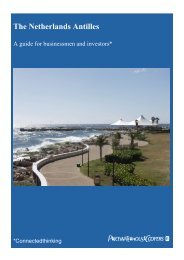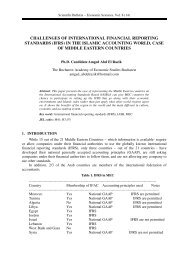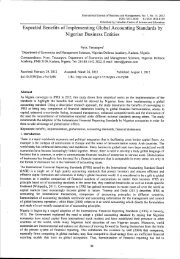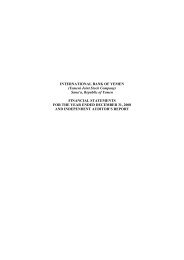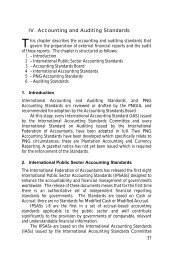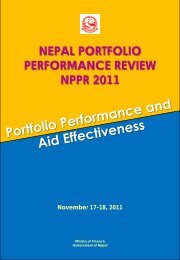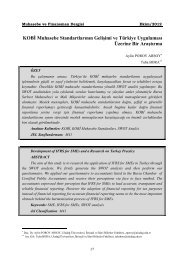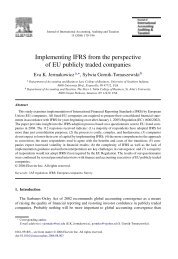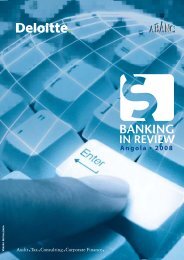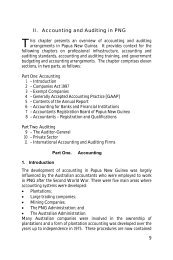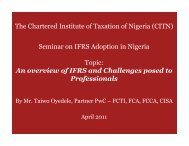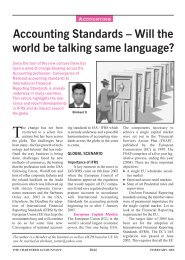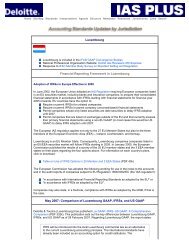Harmonization of Accounting Standards withing the Caribbean & the ...
Harmonization of Accounting Standards withing the Caribbean & the ...
Harmonization of Accounting Standards withing the Caribbean & the ...
You also want an ePaper? Increase the reach of your titles
YUMPU automatically turns print PDFs into web optimized ePapers that Google loves.
<strong>Harmonization</strong>3Providing solutions that count• De jure - rules based, standards, etc..E.G. 4th and 7th EU directives• De facto - market forces persuadecompanies to harmonise by preparingfinancial reports that approximate tothose <strong>the</strong> market wants e.g.IAS/IOSCODavid Raggay June, 2005
World Capital Markets as7Providing solutions that countat April 2005Issuers Foriegn• NYSE 1,834 454• NASDAQ 2,884 331• Euronext 1,302 319• London Stock Exch. 2,942 349• Switzerland 347 118• Australia 1,624 69• Singapore 652 102David Raggay June, 2005
World Capital Markets8Providing solutions that countNon-US Companies Registeredwith <strong>the</strong> US SEC• 1,240 companies from 55 countriesat 31 December 2004David Raggay June, 2005
<strong>Harmonization</strong> <strong>of</strong>9Providing solutions that count<strong>Accounting</strong> Practices• The current world trend is towardsconvergence• Moving toge<strong>the</strong>r toward a common result• Overall IASB agenda• Specific IASB/FASB projectDavid Raggay June, 2005
<strong>Harmonization</strong> vs10Providing solutions that countConvergence<strong>Harmonization</strong>ConvergenceDavid Raggay June, 2005
11Adoption <strong>of</strong> IFRSProviding solutions that count• May 2000: (IOSCO) recommended thatits members “permit incomingmultinational issuers to use <strong>the</strong> 30“IASC 2000” standards to prepare<strong>the</strong>ir financial statements for cross-border <strong>of</strong>ferings and listings .”.David Raggay June, 2005
12Adoption <strong>of</strong> IFRSProviding solutions that count• May 2002, IOSCO survey: “manyjurisdictions permit incoming issuers touse IAS, and o<strong>the</strong>rs are activelyworking towards this end.”David Raggay June, 2005
IFRS Convergence13Providing solutions that countTwo major sets <strong>of</strong> GAAP• IFRS• US GAAPEfforts currently underway to achieveconvergence between IFRS and USGAAPDavid Raggay June, 2005
IFRS Convergence14Providing solutions that count• IAS/IFRS are <strong>the</strong> primary accountingstandards in use• Over 90 countries currently requireIAS/IFRS for domestic listed companiesDavid Raggay June, 2005
IFRS Convergence15Providing solutions that countAnomalies• Australia• New Zealand• EUDavid Raggay June, 2005
International16Providing solutions that countConvergenceMajor problems (Wong Report, Sept. 2004):• Understanding <strong>the</strong> meaning <strong>of</strong> InternationalConvergence• Translation <strong>of</strong> International <strong>Standards</strong>• Complexity and structure <strong>of</strong> International<strong>Standards</strong>David Raggay June, 2005
International17Providing solutions that countConvergenceMajor problems (Wong Report, Sept. 2004)continued:• Frequency, volume and complexity <strong>of</strong>Changes to International standards• Challenges for SMEs and SMPs• Potential Knowledge Shortfall and• Implications <strong>of</strong> Endorsement <strong>of</strong> IFRSDavid Raggay June, 2005
The <strong>Caribbean</strong>18Providing solutions that countDr. Eric St. Cyr:• “Critical facts" which "Set limits to <strong>the</strong>nature and possibilities for economicperformance in <strong>the</strong> <strong>Caribbean</strong>“• Geography• issues that "Pertain to location, size andinsular configuration"David Raggay June, 2005
The <strong>Caribbean</strong>19Providing solutions that countCARICOM is vulnerable due to a lack <strong>of</strong>"critical mass" and needs to widen itsmembership. In order to facilitate thisincrease <strong>the</strong> critical mass two concernshave been identified:• Intra-Regional Corporate Integration and• Financial IntegrationDavid Raggay June, 2005
CSME20Providing solutions that countDescribed as having being "conceived asan instrument to facilitate economicdevelopment <strong>of</strong> <strong>the</strong> Member States inan increasingly liberalisedandglobalised international environment".David Raggay June, 2005
CSME21Providing solutions that countThe major components <strong>of</strong> <strong>the</strong> CSME are:• Free movement <strong>of</strong> services• Free movement <strong>of</strong> goods• The free movement <strong>of</strong> people and• Free movement <strong>of</strong> capitalDavid Raggay June, 2005
Financial Reporting In22Providing solutions that countThe <strong>Caribbean</strong>• As <strong>of</strong> June 2003 IFRSs are <strong>the</strong>required Reporting <strong>Standards</strong> forall those <strong>Caribbean</strong> countrieswhose institutes are members <strong>of</strong> <strong>the</strong>Institute <strong>of</strong> Chartered Accountants<strong>of</strong> <strong>the</strong> <strong>Caribbean</strong>, with <strong>the</strong>exception and St.Kitts-Nevis.David Raggay June, 2005
Financial Reporting In23Providing solutions that countThe <strong>Caribbean</strong>• The <strong>Accounting</strong> pr<strong>of</strong>ession in <strong>the</strong><strong>Caribbean</strong> is largely organized intovolunteer organizations• We do not currently have <strong>the</strong> resourcesfor ongoing research and <strong>the</strong>development <strong>of</strong> indigenous standardsDavid Raggay June, 2005
Regulatory Framework24Providing solutions that count• Similar common-law background• <strong>Accounting</strong> Institutes in mostcountries•Legislative enforcement <strong>of</strong> <strong>the</strong>application <strong>of</strong> IFRS in most countriesDavid Raggay June, 2005
Regulatory Framework25Providing solutions that count• Very little in terms <strong>of</strong> formalprograms for enforcement <strong>of</strong>accounting and auditing standards•Great reliance on disciplinarycommittees (whistle blowers) toaddress issues <strong>of</strong> non-complianceDavid Raggay June, 2005
Financial Reporting In26Providing solutions that countThe <strong>Caribbean</strong>Compliance Issues• Inappropriate application <strong>of</strong>standards (IAS 16, 39)• Inadequate or inappropriatedisclosure (IAS 12, 16, 19, 39)David Raggay June, 2005
The IASB27Providing solutions that count• Committed to developing:…. “a a single set <strong>of</strong>high quality, understandable andenforceable global accounting standardsthat require transparent and comparableinformation in general purpose financialstatements”• “Cooperates with national accountingstandard setters to achieve convergence inaccounting standards around <strong>the</strong> world.”David Raggay June, 2005
Structure Of The IASB28Providing solutions that countTRUSTEESS.A.C.AdvisoryC’teesBOARDIFRICAppointsReportingAdvisesDavid Raggay June, 2005
Structure <strong>of</strong> <strong>the</strong> IASB29Providing solutions that count• Founding MembersAustraliaCanadaFranceGermanyJapanThe Ne<strong>the</strong>rlandsMexicoUK/IrelandUSADavid Raggay June, 2005
Structure <strong>of</strong> <strong>the</strong> IASB30Providing solutions that count• Although <strong>the</strong> Board has a process <strong>of</strong> duediligence, <strong>the</strong> reality is that few commentsoriginate from <strong>the</strong> <strong>Caribbean</strong>.• Full use is not made <strong>of</strong> our representation• Voluntary nature <strong>of</strong> <strong>the</strong> <strong>Caribbean</strong> accountingpr<strong>of</strong>ession.• Driven by <strong>the</strong> lack <strong>of</strong> critical mass in <strong>the</strong>membership <strong>of</strong> our accounting institutes whichare primarily financed through membershipdues.David Raggay June, 2005
Convergence With IFRS31Providing solutions that count• IFRS have been created largely fortransnational enterprises operatingfrom developed-country bases• It is difficult to apply <strong>the</strong>m toemerging/developing countries andeven more difficult to do so to SMEs<strong>the</strong>reDavid Raggay June, 2005
Convergence With IFRS32Providing solutions that count• Illiquid capital markets• Equities• Bonds• Difficulty in estimating fair valuesDavid Raggay June, 2005
Practice Monitoring33Providing solutions that count• IFAC• Member bodies should develop qualityreview programs designed to evaluatewhe<strong>the</strong>r firms <strong>of</strong> practicing accountantshave established appropriate qualitycontrol policies and procedures and arecomplying with those policies.David Raggay June, 2005
Practice Monitoring34Providing solutions that count• IFAC• Member bodies should establish qualityreview programs designed to evaluatewhe<strong>the</strong>r firms <strong>of</strong> practicing accountantshave complied with relevant pr<strong>of</strong>essionalstandards for assurance engagements .David Raggay June, 2005
International Financial35Providing solutions that countReporting• In most English-speaking speaking <strong>Caribbean</strong>countries, IFRS apply to all companies,whe<strong>the</strong>r listed or notDavid Raggay June, 2005
Why address <strong>the</strong>36Providing solutions that countFinancial ReportingNeeds <strong>of</strong> SMEs• <strong>Caribbean</strong> economies are largelycharacterized by small and mediumenterprises (SMEs(SMEs).• Large in number• Impact on <strong>the</strong> labour market• Contribution to <strong>the</strong> economyDavid Raggay June, 2005
Why Address <strong>the</strong>37Providing solutions that countFinancial ReportingNeeds <strong>of</strong> SMEsNumber <strong>of</strong> listed companies in formalstock exchangesIssuers Crosslisted• Bahamas 19 1• Barbados 26 5• Jamaica 46 4• Trinidad and Tobago 33 8David Raggay June, 2005
Financial Reporting38Providing solutions that countNeeds <strong>of</strong> SMEs• Cost <strong>of</strong> capital• Listing requirements are not equivalent to<strong>Accounting</strong> requirements• SMEs typically have significant difficulties inaccessing bank and trade credit• (FASB 1983 report)- costs <strong>of</strong> preparationsometimes exceed <strong>the</strong> benefits to be derivedDavid Raggay June, 2005
Financial Reporting39Providing solutions that countNeeds <strong>of</strong> SMEs• Users and Uses• In <strong>the</strong> case <strong>of</strong> <strong>the</strong> SMEs, , <strong>the</strong> public will rarely bea user• General-purpose financial statements will stillbe necessaryDavid Raggay June, 2005
Financial Reporting40Providing solutions that countNeeds <strong>of</strong> SMEs• User Needs• Investors – In <strong>the</strong> SME environment, <strong>the</strong>se are <strong>of</strong>ten <strong>the</strong>same as• Lenders – Banks and o<strong>the</strong>r sources <strong>of</strong> private finance are<strong>the</strong> primary capital• Governments and <strong>the</strong>ir agencies – interested in <strong>the</strong>allocation <strong>of</strong> development resources to SMEs. . They alsorequire information in order to regulate <strong>the</strong>ir activities,determine taxation policies etcDavid Raggay June, 2005
Financial Reporting41Providing solutions that countNeeds <strong>of</strong> SMEs• User Needs• Suppliers and o<strong>the</strong>r trade creditors – interested ininformation that enables <strong>the</strong>m to determine whe<strong>the</strong>ramounts owing to <strong>the</strong>m will be paid when due• Customers – have an interest in information about <strong>the</strong>continuance <strong>of</strong> an enterprise, especially when <strong>the</strong>y havea long-term• Employees – interested in information about <strong>the</strong> stabilityand pr<strong>of</strong>itability <strong>of</strong> <strong>the</strong>ir employers and in information,which enables <strong>the</strong>m to assess <strong>the</strong> ability <strong>of</strong> <strong>the</strong>enterprise to provide remuneration, retirement benefitsand employment opportunities.David Raggay June, 2005
International Financial42Providing solutions that countReporting• Research indicates that no majordeveloped country requires that SMEsfully comply with GAAPDavid Raggay June, 2005
Issues to Consider43Providing solutions that countIASs <strong>of</strong> concern to SMEs• IAS12 - Income Taxes• IAS 17 – Leases• IAS 19 - Employee Benefits• IAS 36 -Asset impairment• IAS 32/39David Raggay June, 2005
Issues to Consider44Providing solutions that countIAS IssuesMany <strong>of</strong> <strong>the</strong> disclosures required by IASare considered to be “over <strong>the</strong> top” in<strong>the</strong> case <strong>of</strong> SMEs.David Raggay June, 2005
Issues to Consider45Providing solutions that countIAS Issues.There is doubt as to <strong>the</strong> usefulness <strong>of</strong> fairvalues to users <strong>of</strong> SME financialstatements.David Raggay June, 2005
Results <strong>of</strong> Consultation46Providing solutions that countNeed for concessions for SMEs.There is support for disclosure andpresentation as well as recognition andmeasurement concessions. There was amixed reaction as to whe<strong>the</strong>r SMEstandards should be presented in a separatevolume or toge<strong>the</strong>r with existing IFRS.David Raggay June, 2005
Development <strong>of</strong> <strong>the</strong> IASB47Providing solutions that countProject• April 1998 - project on “EmergingEconomies” added to <strong>the</strong> Board’sAgenda• June, 2002 – “<strong>Accounting</strong> and financialreporting by small and medium-sizedentities (SME) and in emerging andtransition economies”David Raggay June, 2005
National Standard-SettersSetters48Providing solutions that count1. Australia2. Canada3. China4. EFRAG5. France6. Germany Hong Kong7. Hungary8. IndonesiaDavid Raggay June, 2005
National Standard-SettersSetters49Providing solutions that countcont’d9. Italy10. Iran11. Korea12. Malaysia13. New Zealand14. Norway15. Pakistan16. PolandDavid Raggay June, 2005
National Standard-SettersSetters50Providing solutions that countcont’d17. Russia18. Singapore19. South Africa20. Spain21. Sri Lanka22. Sweden23. Thailand24. United Kingdom25. United StatesDavid Raggay June, 2005
Responses to 200451Providing solutions that countDiscussion Paper• PV 7.3: There would be a rebuttablepresumption that no modifications would bemade to <strong>the</strong> recognition and measurementprinciples in IFRSs.• 65% <strong>of</strong> respondents to DP did not agree.• Felt recognition and measurementmodifications are needed.• Concerned that IASB is prejudging.• Cited growing measurement complexities inIFRSs.David Raggay June, 2005
January 2005 Board52Providing solutions that countDecisions• The Board decided, inter alia, , that• Recognition and measurementsimplifications will be considered– basedon user needs and cost/benefit.• “Mandatory fallback” was approved• “Optional fallback” was not approvedDavid Raggay June, 2005
January 2005 Board53Providing solutions that countDecisions• The Board decided, inter alia, , that• IASB <strong>Standards</strong> for SMEs will focus on financialreporting by those non-publicly accountableentities that have external users <strong>of</strong> <strong>the</strong>ir financialstatements (ieusers o<strong>the</strong>r than owner-managers).This is because <strong>the</strong> IASB Framework for <strong>the</strong>Preparation and Presentation <strong>of</strong> FinancialStatements (<strong>the</strong> IASB Framework) does not dealwith management reporting or regulatoryreporting. Jurisdictions could, <strong>of</strong> course, chooseto permit or require <strong>the</strong>m for all SMEs, , includingvery small ones.David Raggay June, 2005
February 2005 Board54Providing solutions that countDecisions• The Board approved a project plan outliningsteps to create standards for what werebriefly called Non-publicly AccountableEntities (NPAE), but...• Terminology was not widely understood.• The term was considered to be possibly havenegative connotations (not accountable?).• The Board approved <strong>the</strong> expansion <strong>of</strong> <strong>the</strong>Working Group to include preparers andusers <strong>of</strong> financial statements <strong>of</strong> Non-publiclyAccountable EntitiesDavid Raggay June, 2005
February 2005 Board55Providing solutions that countDecisions• Project Plan key elements:• 31 March 2005:– Brief questionnaire to identify recognitionand measurement issues for discussion atround tables.• 30 June 2005:• Questionnaire comment deadline (thosereceived by 31 May will be analysed forJune SAC and Working Group meetings).David Raggay June, 2005
February 2005 Board56Providing solutions that countDecisions• Project Plan key elements:• June 2005 – November 2005:– Discussion with SAC, WG and RoundTable groups on:– Recognition and Measurement issues– Presentation and Disclosure issues• March 2006:– Exposure draft• 2007– Final <strong>Standards</strong> effective January 1, 2008David Raggay June, 2005
Impact57Providing solutions that count• The current focus on “those“non-publicly accountable entities that haveexternal users <strong>of</strong> <strong>the</strong>ir financialstatements” is biased towards <strong>the</strong> largercompanies• The standards developed using thisfocus are unlikely to address <strong>the</strong> needs<strong>of</strong> <strong>the</strong> SMEs in <strong>the</strong> English-speakingspeaking<strong>Caribbean</strong>David Raggay June, 2005
Impact58Providing solutions that count• We find support for this view in arecent statement issued by CILEA who“deemed it unavoidable to make a cleardistinction between <strong>the</strong> rules to beapplied to listed companies operating on<strong>the</strong> world stock-markets and to o<strong>the</strong>rbig entities, and to those to be applied toall o<strong>the</strong>r entities, mainly SMEs.”David Raggay June, 2005
Impact59Providing solutions that count• This was also reportedly <strong>the</strong> sentimentexpressed at <strong>the</strong> IFAC SME/SMP andDeveloping Nations Conference held inPrague in March 2005David Raggay June, 2005
60Providing solutions that countConclusions andRecommendations• Lack <strong>of</strong> significant influence at decision-making levels <strong>of</strong> <strong>the</strong> IASB.• Ineffective use <strong>of</strong> existing opportunities.• While <strong>the</strong> level <strong>of</strong> convergence with IFRS inpublished financial statements is generallyacceptable, <strong>the</strong>re is room for improvement.• We and o<strong>the</strong>rs may have no choice but todevelop our own standards for SMEs if <strong>the</strong>current trend at <strong>the</strong> IASB continuesDavid Raggay June, 2005
Conclusions and61Providing solutions that countRecommendations• Adoption and enforcement <strong>of</strong> a system <strong>of</strong>Quality Control for public accountants andauditors• Adopting standardized curriculums foraccounting degrees at UWI and enforcingmandatory CPD• Educating management, investors, bankers,creditors and <strong>the</strong> public in general <strong>of</strong> <strong>the</strong>benefit that will accrue from credible financialinformationDavid Raggay June, 2005
62Conclusions andProviding solutions that countRecommendations• ICAC members should adoptstandardized examinations inCompany Law and Taxation• ICAC members should establish anindependent regulatory body thatsets <strong>the</strong> requirements for licensing<strong>Caribbean</strong> accountants inaccordance with IFAC guidelinesDavid Raggay June, 2005
63Providing solutions that countConclusions andRecommendations• Co-operation operation among <strong>the</strong> following inorder to achieve enforcement:• The ICAC• National <strong>Accounting</strong> Institutes• Regional and International lendinginstitutions• National regulators, financial institutionsand government institutionsDavid Raggay June, 2005
64Providing solutions that countConclusions andRecommendations• ICAC should consider fostering closeworking relationships with othherregional accounting bodies• Concerted efforts should be made tomake better use <strong>of</strong> existingrepresentation on <strong>the</strong> IASB SMEWorking GroupDavid Raggay June, 2005
65Providing solutions that countConclusions andRecommendationsWe find support for <strong>the</strong>serecommendations from:• Sotomayer (2001)• Wong (2004)David Raggay June, 2005
66Providing solutions that countTHANK YOUDavid Raggay June, 2005



